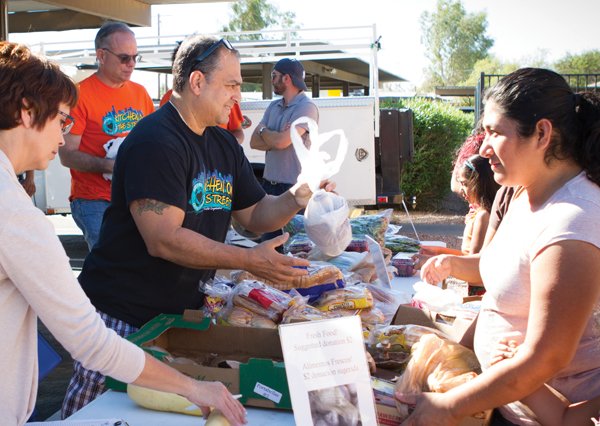Investing in hope
Alumnus of MBA in financial planning rethinks the fight against hunger

In 2006, the same year that he enrolled in his online master’s program, Vince Scarpinato, MBA ’10, his wife, Lisa, and their daughter, Taylor, began the earnest dinner-table conversations that soon would lead to the founding of Kitchen on the Street (KOS), a nonprofit dedicated to alleviating hunger, especially among schoolchildren.
The organization distributes backpacks of nutritious food on Fridays, year-round, to about 1,300 kids at 22 schools in Phoenix and, now that one of Scarpinato’s co-workers is involved, to another 200 children in San Antonio schools. As the Scarpinatos were once astounded to learn, the “bags of hope” are often the only food these children get on the weekend.
Corporations, churches and hundreds of volunteers support KOS, and last year it received a $100,000 grant from the Arizona Diamondbacks baseball team for a mobile food truck. The truck is used for cooking demonstrations and brings in revenue for the “bags of hope” program.
Meanwhile, the Scarpinatos have found the sense of purpose they were seeking around the dinner table. Lisa ultimately quit her job as an aviation claims adjuster to become KOS’s full-time CEO. Taylor, 20, is also interested in a career in nonprofit management. Vince, who manages a team of financial advisers for USAA (United Services Automobile Association), was recognized by the Fortune 500 employer as 2013 Volunteer of the Year.
All in all, the work is gratifying. Volunteers keep returning to KOS to ask what more they can do.
“People can’t help enough,” Vince said. “You see kids with better attendance, better grades, less behavior problems, better health. You see these numbers, and it’s like, wow, that’s just from kids getting food on the weekends.”
For all that KOS has been able to accomplish, Vince Scarpinato cannot help noticing that the need never goes away. He is not comfortable with giving away food, he said, if giving creates the expectation that free food will always be available. He dislikes the sound of publicity for food banks that cites growth in the numbers of people served.
“Kitchen on the Street doesn’t do that. Our objective is to have less kids needing food,” he said. “What we’re trying to figure out is, what does ‘done’ look like? How do we put ourselves out of business?”
As an MBA student, Scarpinato learned more about how businesses seek new patrons than about how a nonprofit can shed them. Nevertheless, he is now using principles that he learned through his MBA emphasis in financial planning to rethink the fight against hunger.
This year, KOS is piloting a community-asset-based program in Phoenix, known as Market on the Street, in an attempt not only to bring fresh food into “food deserts,” but also to establish an emergency fund for people in poor communities without markets.
Think of it as a “small, little investment company,” Scarpinato said. The initial capital comes from donations of rescued food, crops that otherwise would have been thrown away, plowed underground or fed to animals. KOS delivers the food to the makeshift market, sells it for $1 or $2 a bag, and puts the proceeds into a fund that can help community members to survive a “life event” such as an illness or a major repair. With matching funds from corporations and individuals, the pot will be big enough to draw on.
“This is for people who just want to start to put a few bucks away, so that if junior needs a tooth pulled, they have the money for it,” Scarpinato explained. Borrowers would have to pay the money back in a fixed period, at no interest.
With the community-asset model, Scarpinato hopes to avoid shortcomings of some aid programs. Taking money from outside of the community can create a culture of dependence, he said, and loans between neighbors create enemies, not a sense of solidarity.
“These people have to start to depend on one another in times of need, and that doesn’t mean loaning money to each other or going to the pawn shop,” he said. “We’ll know we’re making an impact when we see less kids who actually need food.”
Learn more about KOS at www.kitchenonthestreet.org. CLU-trained financial planners who are willing to donate time to help poor communities are invited to contact Scarpinato at info@kitchenonthestreet.org.